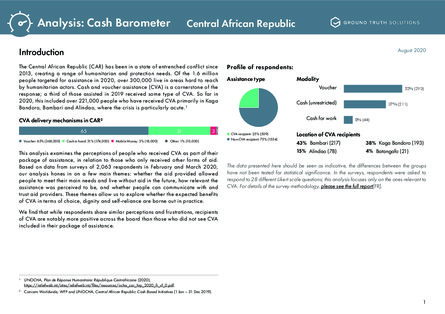
The Central African Republic (CAR) has been in a state of entrenched conflict since 2013, creating a range of humanitarian and protection needs. Of the 1.6 million people targeted for assistance in 2020, over 300,000 live in areas hard to reach by humanitarian actors. Cash and voucher assistance (CVA) is a cornerstone of the response; a third of those assisted in 2019 received some type of CVA. So far in 2020, this included over 221,000 people who have received CVA primarily in Kaga Bandoro, Bambari and Alindao, where the crisis is particularly acute.
This analysis examines the perceptions of people who received CVA as part of their package of assistance, in relation to those who only received other forms of aid. Based on data from surveys of 2,063 respondents in February and March 2020, our analysis hones in on a few main themes: whether the aid provided allowed people to meet their main needs and live without aid in the future, how relevant the assistance was perceived to be, and whether people can communicate with and trust aid providers.
These themes allow us to explore whether the expected benefits of CVA in terms of choice, dignity and self-reliance are borne out in practice. We find that while respondents share similar perceptions and frustrations, recipients of CVA are notably more positive across the board than those who did not see CVA included in their package of assistance.